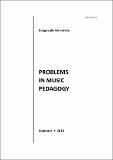African music scholars are currently grappling with the challenges of refocusing musical arts based on indigenous knowledge for classroom practice as well as developing Africa-sensed musical arts curricula that use culturally appropriate pedagogies derived from viable theoretical, philosophical and performance practices of indigenous music. The African spirit of humanity encourages all-inclusive participation that bonds participants in performance-based learning situations. The philosophy framing an assessment model should derive from the ideology of humanity (grounded in humane qualities and aspirations) embedded in musical arts education indigenous to the area of a culture. This model should enable and acknowledge demonstration of differentiated innate attributes and take into account the compatible skills of every participant in the learning activity. Rigid assessment yardsticks are often transferred from Western elitist music education practice and used in the assessment of the musical arts in Africa, thus compromising innate musicality. In this article we advocate for assessment initiatives that should enhance the humanity virtues of indigenous intellectual and praxial paradigms, as well as taking note of epistemological logic embedded in contemporary realities. Two different examples from two African countries are used to illustrate our argument (PROBLEMS IN MUSIC PEDAGOGY, 2010)
Most studies have used the element of listening response to musical stimuli to determine
music preferences of the various groups studied. In this study however, the term
preference is used to mean the art of choosing one ...

